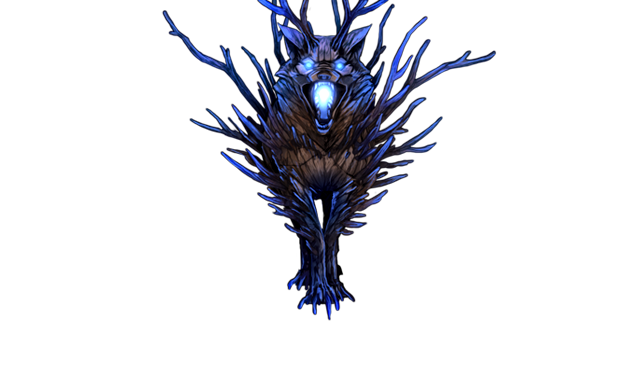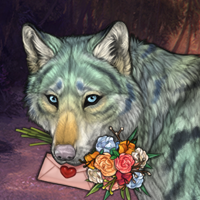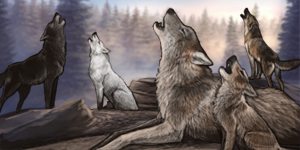Darkvalley Pack

Darkvalley Pack Territory
A sprawling expanse of shortgrass prairie makes up the Pack's homeland. While the Pack has territorial offshoots created as routes for scouting and exploring other biomes, their home is in this prairie. Most of the land is sparsely dotted with shrubs and short brush. The northern range of the territory is lined with bluffs, cliffs, and stretches of rougher terrain that smooths out towards the southern range.
Landmarks:
Darkvalley Stream: The largest stream in the territory, this stream runs northwest and cuts through the center of the territory and supplies the camp. Its banks are steep and rocky and the nearby area is rich with vegetation. Its fast-moving, deep waters make it a reliable water source even in the arid summer months when its tributaries often dry up.
Coyote Creek: A small tributary running east of Darkvalley Stream, this shallow stream runs through a long stretch of barren ground, but the creek's banks allow for some growth of sparse grasses and the occasional shrub. The shallow waters mean that the creek often dries up in the summer, leaving only stagnant pools in the deepest sections of the stream bed.
Overlook Bluffs: The highest elevation in the territory situated in its northern range, this towering stretch of bluffs provides a lookout over the entire prairie. The bluffs are rather difficult to scale for an unpracticed wolf, and the natural barricade created by the bluffs renders the territory difficult to invade from the north border.
Lowland Stream: A small, meandering stream sourced by Darkvalley Stream and reaching the south end of the territory, this stream has soft, shallow banks and is surrounded by flat land prone to flooding over in the rainy seasons, forming a floodplain in the territory's Lowlands.
The Lowlands: An expanse of open flatland interspersed with patches of brush and grass, this low-elevation area makes up the territory's southern border. Most of the year, the land here is dry and barren, while in the spring, floodplains are created by the stream supplying it. This is where unranked wolves are commonly found as they move into or out of the territory.
Darkvalley Pack Camp
Set between small bluffs and rock formations on shortgrass prairie terrain, the prairie camp is spacious to occupy the large and expanding Darkvalley Pack. The largest rift between the bluffs serves as the main entrance and exit and is lined with dense brush and large thickets. Tunnels dug beneath the rocks serve as secret passageways for a quick entrance or escape when needed. The is a large central clearing for Pack members to eat their prey, socialize, and for hunting parties to rally together before setting out. The Leader watches over and addresses the Pack from the highest boulder, the boulder serving as a vantage point giving a bird's-eye view of the camp and the surrounding area. Hunters and Scouts sometimes sleep under the stars in open sleeping areas in the clearing or outside camp on the prairie, especially in the warmer months where the weather is good. The Juveniles' Den also has its own open space behind it where the Pack adolescents may sleep outside. Dens are tucked in the boulders as sleeping spots, as well as serving as shelter in inclement weather or as a source of shade during the height of the day. A stream cutting through the territory that curves around the camp's walls serves as a water source as well as storm drainage in the wetter months.
Pack Ranks
Leader: The head wolf in the Pack, the leader makes important decisions regarding territory, hunting, and other crucial parts of Pack life. They organize hunting parties and scout missions as they see fit, as well as venturing established territory to fend off threats and mark borders, and recruiting new wolves. If the Leader has a mate, they serve as a co-leader and sleep next to the Leader under a rock ledge beneath the boulder.
Lead Hunter: The Lead Hunter is chosen for their experience and competence as a hunter, and they work directly with the Leader in organizing hunts and keeping tabs on prey inventory as well as with the Scouts to interpret information on prey movements to guide key hunting decisions. In their absence, the Deputy Hunter takes on this role.
Deputy Hunter: An experienced Hunter chosen as the Lead Hunter's second-in-command. They report directly to the Lead Hunter and perform the Lead Hunter's job in their absence and are next in line for the rank.
Third Hunter: The third-in-command Hunter, taking on the Lead Hunter role in the absence of the Lead Hunter and their Deputy, and third-in-line for the Lead Hunter's role. They report to the Deputy Hunter in most cases, but will work directly under the Lead Hunter when serving in the Deputy Hunter's absence.
Hunters: Hunters are the most abundant role and the lifeblood of the Pack, expected to bring back a large share of prey to feed the Pack. They are assigned to different hunting parties and are tasked with tracking, chasing, or killing prey depending on their strengths. Huntmates in the same party usually become very close and spend a lot of time together.
Scouts: Scouts are the trailblazers, responsible for scouting out new territory. They are sent out on solo missions to discover new regions and clear them to be established as new territory, then recheck the territory regularly. They often travel through vacant lands and buffer zones outside territorial bounds. They have the responsibility of tracking rival Packs and their movements, territorial boundaries and buffer zones, as well as prey migrations, and then reporting to the Leader with information.
Head Pupsitter: An experienced Pupsitter with the task of helping with pupsitting assignments and deciding when to recruit unranked wolves into the rank to resolve Pupsitter shortages during pup seasons. They also help to teach Pupsitting techniques to younger wolves and assign den watch shifts to Pupsitters.
Deputy Pupsitter: The Head Pupsitter's second-in-command. They assist the Head Pupsitter in their role and take over the Head Pupsitter's position in their absence, as well as being their next in line for the rank.
Pupsitters: Pupsitters are in charge of watching the pups and being their secondary caretakers other than their parents. They must keep pups out of danger and keep a close eye on them while they are out playing, and defend the den when necessary. Their den is situated around the nursery so that they can easily protect it.
Herbalist: The healer of the Pack, the Herbalist's job includes collecting various herbs, mixing herbs to make medicine, and diagnosing and treating illness and injury. Their job requires extensive knowledge on different herbal plants and their environments, as well as mixing the precise amounts of herbs for medicines. The Herbalist also makes decisions on when a Pack member should be quarantined to curb the spread of a contagious disease. Packmates often confide in the Herbalist about their problems due to the listening ear that they lend and their trustworthiness in the Pack. An Herbalist must care for all Packmates equally and never allow biases or personal feelings to get in the way.
Mentor: An older wolf chosen from the Hunter or Pupsitter role, tasked with training pups and qualified to train any lesson. Although pups may be trained by any adult Packmate, the Mentor may step in during specialized training lessons when the Leader, Herbalist, or Scout usually responsible for the lesson is unavailable.
Juveniles: These are adolescent wolves, between six months and eleven and a half months old. At this age, they begin to participate in more advanced training, having the opportunity to come on hunts, scout missions, and herb gathering missions. They may also have the opportunity to help out with camp tasks such as building and repairing dens, but still spend much of their day playing.
Pups: Pretty self-explanatory. Wolves younger than six months of age. Feeding the pups is always a top priority in the Pack, and they are cared for by their parents as well as the Pack's Pupsitters. They recieve light training from their Packmates or the Mentor in all areas of Pack life.
Pack Elders: The Pack's eldest wolves who have seen the Pack change throughout the course of countless seasons and generations, since retired from their typical Pack duties and serving an important role in advising Packmates and recordkeeping, preserving the stories of eras gone by and wolves who lived long before.
Unranked Wolves: Newly recruited wolves and some yearlings may remain unranked for sometime while deciding their path. These wolves often stay near the outskirts of the prairie territory, or temporarily serve as Pupsitters in times of need. Unranked wolves usually recieve their rank soon, or leave the territory to join another Pack.
Pack Values
(Placeholder)
| Pack Leader Lovelace | ||||||||||||
|---|---|---|---|---|---|---|---|---|---|---|---|---|
|




